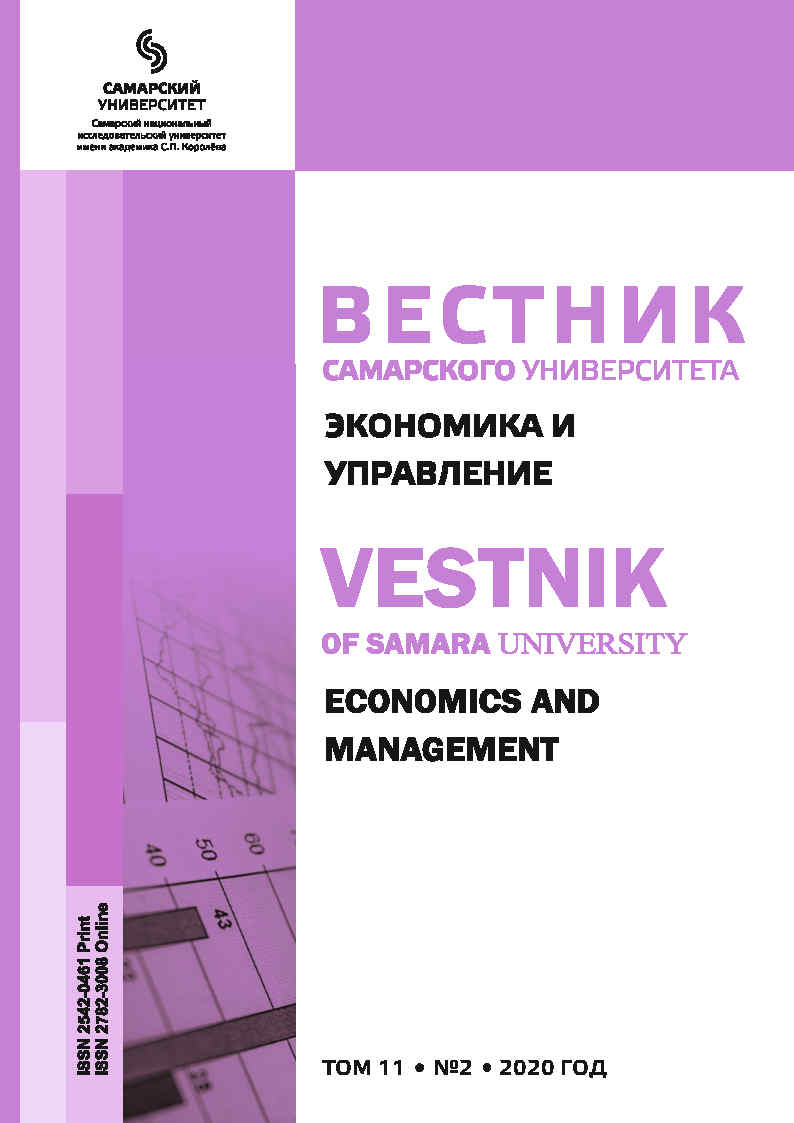ASSESSMENT OF THE EFFECTIVENESS OF IMPLEMENTING «SMART CITY» ELEMENTS IN THE PROCESS OF DIGITALIZATION OF THE URBAN ENVIRONMENT
- Authors: Tsybareva M.E.1, Vasyaicheva V.A.1
-
Affiliations:
- Samara National Research University
- Issue: Vol 11, No 2 (2020)
- Pages: 83-91
- Section: ECONOMICS
- URL: https://journals.ssau.ru/eco/article/view/7853
- DOI: https://doi.org/10.18287/2542-0461-2020-11-2-83-91
- ID: 7853
Cite item
Full Text
Abstract
The article presents scientific, practical and methodological results of evaluating the effectiveness of implementing «smart city» elements. The main problems of digitalization of the urban environment in Russia are highlighted. The concepts of «smart city» and «digitalization» are revealed. Digitalization is considered as the introduction of digital technologies. A model of a «smart city» is constructed and the trajectory of urban development according to the SMAT CITY 3.0 vector is revealed. The efficiency indicators of the digital transformation of urban economy are determined and methods for evaluating the effectiveness of
the implementation of «smart cities» (the city's IQ index): index and integral indicators. The integral method is based on a score. The index method is based on determining the maximum and minimum values. Enter the variable t (time). Time in assessing the effectiveness of digital transformation of cities is a new opportunity to realize the professional abilities of the population and the productive recovery of human life parameters. The score is based on performance indicators for implementing «smart city» elements, and the threshold values for this indicator are determined. The threshold values are compared with the current data. Regions of Russia with low and high efficiency of smart cities implementation are identified. The city of Moscow was put in the first place with a high efficiency of implementing «smart cities».
About the authors
Marina E. Tsybareva
Samara National Research University
Author for correspondence.
Email: tsibareva@mail.ru
Candidate of Economic Sciences, associate professor of the Department of Human Resource Management
Russian FederationVera A. Vasyaicheva
Samara National Research University
Email: veraavasyaycheva@yandex.ru
Candidate of Economic Sciences, associate professor of the Department of Human Resource Management
Russian FederationReferences
- Anthopoulos L., Janssen M., Weerakkody V. A Unified Smart City Model (USCM) for smart city conceptualization and benchmarking. International Journal of Electronic Government Research, 2016, vol. 12, issue 2, pp. 77–93. DOI: http://doi.org/10.4018/IJEGR.2016040105.
- Nam T., Pardo T.A. Conceptualizing smart city with dimensions of technology, people, and institutions. Proceedings of the 12th Annual International Conference on Digital Government Research, 2011, pp. 282–291. DOI: http://doi.org/10.1145/2037556.2037602.
- Albino V., Berardi U., Dangelico R.M. Smart cities: Definitions, dimensions, performance and initiatives. Journal of Urban Technology, 2015, vol. 22, issue 1, pp. 3–21. DOI: http://doi.org/10.1080/10630732.
- Harrison C., Eckman B., Hamilton R., Hartswick P., Kalagnanam J., Paraszczak J., Wiliams P. Foundations for smarter cities. IBM. Journal of Research and Development, 2010, vol. 54, no. 4, pp. 1–16. DOI: http://doi.org/10.1147/JRD.2010.2048257.
- Mora L., Bolici R. How to become a smart city: Learning from Amsterdam. In: Bisello A., Vettorato D., Stephens R., Elisei P. (eds) Smart and sustainable planning for cities and regions. Springer, 2015, pp. 251–266. DOI: http://doi.org/10.1007/978-3-319-44899-2_15.
- National project «Housing and urban environment». Approved by the protocol of the meeting of the Presidium of the Presidential Council on Strategic Development and National Projects dated September 24, 2018, № 12. Available at: https://minstroyrf.gov.ru/upload/iblock/426/Pasport-natsionalnogo-proekta-_ZHile-i-gorodskaya-sreda_.pdf (accessed 02.01.2020). (In Russ.)
- Program «Digital Economy of the Russian Federation» approved by the Government of the Russian Federation dated July 28, 2017 № 1632-р. Available at: http://static.government.ru/media/files/9gFM4FHj4PsB79I5
- v7yLVuPgu4bvR7Mpdf (accessed 02.01.2020). (In Russ.)
- Goncharenko L.P., Sybachin S.A. Digitalization of national economy. Vestnik universiteta, 2019, no. 8, pp. 32–42. DOI: https://doi.org/10.26425/1816-4277-2019-8-32-38. (In Russ.)
- Gribkov R.V., Mukhin M.A. Smart city: conceptual approach to creating digital platform for smart city at the municipal level. In: Management Development in Industry 4.0: Transition to Cyberphysical Organizations and the Formation of Their Management Systems: materials of the XI Russian Research and Practical Conference (with international participation). Perm: Izd-vo Perm. un-ta, 2018, pp. 49–51. Available at: https://elibrary.ru/item.asp?id=37043748. (In Russ.)
- Vlasova N.Yu. From a safe city to a smart city: a strategic approach. In: Economic and legal problems of ensuring economic security: proceedings of the All-Russian Research and Practical Conference. Ekaterinburg: Izd-vo Ekater. un-ta, 2018, pp. 163–166. Available at: https://elibrary.ru/item.asp?id=36888260. (In Russ.)
- IMD Smart City Index 2019. IMD Real Learning. Available at: https://www.imd.org/research-knowledge/reports/imd-smart-city-index-2019 (accessed 02.01.2020).
- Russian cities rated by IQ. C-news. Available at: https://cnews.ru/news/top/2020-03-04_rossijskie_goroda_razdelili (accessed 12.03.2020). (In Russ.)
Supplementary files









